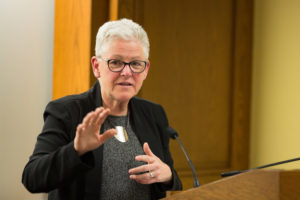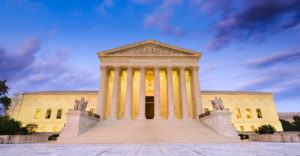
Supreme Court will hear case on deference to agencies, EPA and Army Corps of Engineers propose new definition to “waters of the United States,” and more…
IN THE NEWS
- The U.S. Supreme Court agreed to hear the case Kisor v. Wilkie, in which it will decide whether to strike its prior rulings directing courts to defer to administrative agencies’ interpretations of their own regulations. Under the Court’s Auer v. Robbins and Bowles v. Seminole Rock decisions, if an agency’s regulation is ambiguous, courts are to refrain from disturbing the agency’s interpretation of the regulation as long as it was reasonable. The Court declined to review Auer and Seminole Rock in March, before Justice Brett Kavanaugh replaced Justice Anthony Kennedy on the bench.
- The U.S. Environmental Protection Agency (EPA) and the U.S. Department of the Army proposed a rule that would narrow the federal government’s authority over “waters of the United States” under the Clean Water Act. “Our proposal would replace the Obama EPA’s 2015 definition with one that respects the limits of the Clean Water Act,” EPA Acting Administrator Andrew Wheeler said. Jon Devine of the Natural Resources Defense Council called the proposed rule “reckless,” saying that the “Trump Administration will stop at nothing to reward polluting industries and endanger our most treasured resources.”
- Although the Bureau of Ocean Energy Management of the U.S. Department of the Interior is still collecting public comment on potential wind energy development in California, Castle Wind, a wind farm company, signed a deal with a California city to be its exclusive source of offshore energy. The U.S. Department of Defense, however, has opposed such projects, since it uses the coast for military exercises. Environmental groups have also cautioned against taking any quick action, with Jennifer Savage of the Surfrider Foundation reportedly noting that the Trump Administration “has shown recklessness in its disregard for marine life.”
- The U.S. Supreme Court declined to review a case addressing whether Medicaid laws allow individuals to sue a state for removing a provider—specifically, Planned Parenthood—from the state’s Medicaid program. As a result, the U.S. Court of Appeals for the Fifth Circuit decision that Medicaid protects individuals’ right “to obtain medical care from the Medicaid provider of their choice” will stand. Justice Clarence Thomas, who voted to hear the case, wrote that the Court’s decision not to review was “a refusal to do its job” and to address “confusion among the lower courts” that have decided the Medicaid issue differently.
- The Federal Communications Commission (FCC) announced an investigation into whether wireless service providers have been providing false data about their coverage areas in violation of the FCC’s Mobility Fund II plan. FCC Chairman Ajit Pai stated that it was “critical” that FCC have accurate coverage maps, and he noted the importance of ensuring “the data is accurate before we can proceed.”
- The U.S. House of Representatives approved a bill that would give the U.S. Department of Health and Human Services the authority to reclassify drugs that manufacturers had deliberately mislabeled and enforce penalties. U.S. Senator Chuck Grassley (R-Iowa), one of the bill’s authors, discussed Mylan, which paid a $465 million settlement last year for misclassifying EpiPens. Grassley described Mylan’s behavior as a “deception,” and he stated the need for “clear lines of authority to hold the government and the private sector accountable.”
- Delta Air Lines announced that it will no longer allow emotional support animals of any kind on flights longer than eight hours. The airline also banned both emotional support and service animals younger than four months from all flights. Delta cited an 84 percent increase in accidents involving service and support animals from 2016 to 2017 as a primary factor in its decision.
- The Cincinnati City Council passed an ordinance that would raise the legal tobacco purchase age from 18 to 21 within city limits, including e-cigarettes and vaping products. Councilwoman Tamaya Dennard (D) reportedly stated that the ordinance would not criminalize tobacco use by people aged 18 to 20, but that restricting sales to adults 21 and older would reduce “unnecessary and preventable health issues” in the city.
- The Australian Competition and Consumer Commission released a preliminary report on advertising and news generated by digital platforms. The commission described Google and Facebook as “the gateways to online news media for many consumers” and outlined several policy recommendations to regulate digital platforms. Andy O’Connell, head of Content Distribution & Algorithm Policy at Facebook, reportedly expressed his concern about “open ended” regulation that would not address “specific” goals.
WHAT WE’RE READING THIS WEEK
- Anca Chirita, an assistant professor at Durham Law School in the United Kingdom (UK), analyzed the UK’s current withdrawal plan from the European Union in a recent article. She addressed several topics including citizenship, free trade, and competition, and she concluded that despite some drawbacks, the current withdrawal plan “delivers on many of its promises.” Moreover, she stated, “reaching no agreement at all” would “trigger…unacceptable and inhumane” consequences for human rights and the rule of law.
- Former U.S. Representative Rick Boucher (D-Va.), who now represents telecommunications companies, argued that Congress should end the net neutrality debate by legislative action in an article for Bloomberg BNA. According to Boucher, Congress can spur investment in telecommunications infrastructure by writing a statute that includes both net neutrality’s open Internet principles and gives permanence to broadband’s current status as a Title I information service. Only then will telecommunications companies have the regulatory certainty they need to invest in “the race to 5G,” Boucher wrote.
- Regulations inadequately protect minors from exposure to alcohol marketing in Australia, wrote Belinda Reeve of Australia’s University of Sydney Law School in a recent article for the Queensland University of Technology Law Review. In Australia, the Alcohol Beverages Advertising Code prohibits the targeting of minors with alcohol advertisements, but critics have stated that the alcohol industry influences the governance of advertising and does not do enough to enforce and monitor the code. Reeve instead proposed a system to “progressively” increase control over alcohol advertising by giving the government more control over enforcement.



